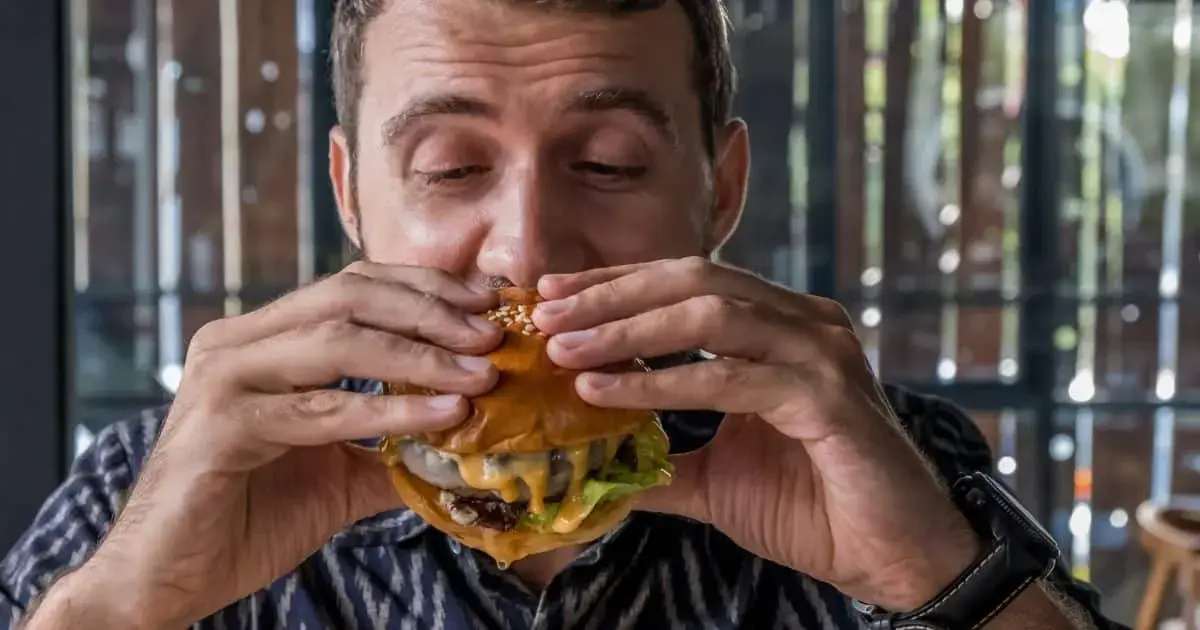TL;DR: the meat industry’s misleading messaging campaign + lobbying
I do eat meat (I do acknowledge that this is an ethical and moral failing) but with the plant-based alternatives being so good I have changed my eating habits a lot.
Plant Based is now what I tend to buy as my first choice in the vast majority of cases and I don’t feel that I’ve lost anything in doing so. This is far from a properly consistent moral choice but it has helped me dramatically lower how much animal products I buy.
Classic plant-based recipes are usually better than the ones that try to replicate a burger with plants.
So I try to change habits and eat vegetarian recipes more often. Still like to eat burger, with chicken meat since it has a smaller impact on the environment.
with chicken meat since it has a smaller impact on the environment.
I had assumed that a plant-based burger would be better for the environment than a meat based burger (including chicken) - or am I entirely wrong here? (I guess there is complexity depending on the type of “plant-based” burger and the type of meat and where it was sourced from etc)
Think of it in terms of inputs and outputs. This is drastically simplified with rounded numbers, but gets the point across.
I can take 1 acre of land, add seed, and 500,000 gallons of water. These are my inputs. From that, I get an output of 2000 pounds of grain. I could take that output and eat it myself. Or I could decide I want to grow meat.
If I grow meat, I need another 1 acre of land, another 100,000 gallons of water, and at least half of that 2000 pounds of grain from my first acre. Now I can grow a cow.
It is more efficient in terms of resource utilization to go directly from plant to human, instead of going from plant to animal to human.
I agree, that is the major reason I try to choose plant based options. I was just thrown by @Hirom saying about chicken being better for the environment, I’m assume they meant it’s better than beef (which it is) but not as good as the plant-based versions.
Exactly, I meant chicken has less impact on the environment than beef. And chicken burger as an alternative to beef burger.
I think we should go harder into mycoculture and Insectivory. We can grow mushrooms or other fungus on our plant waste like wood, paper, and food scraps. We can also feed soldier flies, grubs, ants, termites or grasshoppers on farm and food waste.
Insects and fungi are also WAY more efficient than mammals like cows, or reptiles like birds. And they can both use waste material from agriculture without using up resources that we ourselves could use for ourselves.
I’ve never had an actual meat burger so I can’t really say how this compares, but you can have pretty tasty meat-free burgers with plant based ingredients. For instance, a potato based patty, corn fritters, mushrooms all make for tasty meat-patty replacements. What I personally dislike though is those fake meat burgers, like the “Impossible Beef” one. A burger joint here recently got rid of their portobello mushroom burger and replaced it with an Impossible Beef one, so I gave it a try - and it was disgusting. The portobello mushroom one used to be absolutely delish, and I couldn’t believe they replaced something so tasty, with fake beef. In saying that, my meat eating buddy tried the patty and he said it tasted just fine, almost identical to real beef. So it was my vego taste buds that rejected it, and there was nothing wrong with the fake beef apparently…
Anyways, I digress, I guess what I’m trying to say is, you can definitely have a tasty burger with plant based ingredients.
Without meat ard other animal praducts many simply can’t consume enough complete protein. Plant proteins apart from hemp are limited in their amino acid profile. Milk, meat and egg are staples for good reason
Milk is another great example of industry influencing diet, it is not a necessary component of people’s diet once they are done being a tiny baby.
Can’t or don’t want to? Cutting meat out is quite easy and more obviously a choice when you instead eat eggs, nuts, varied veggies, and legumes. Heck of a lot cheaper too
People do not actually need much animal protein, certainly nowhere near the amount in American and European diets. Given that, it is not super hard for an adult to get the full compliment of necessary protein from a plant based diet. Milk, meat, and eggs are largely staples due to marketing.
That is just not true. Complete protein isn’t really a problem because you just need to get the amino acids in at some point in the day. It takes much less than you’d think for that. For instance, beans technically are incomplete, but beans and rice are complete proteins.
Plus soy, which is an extremely common plant-based protein, is fully complete on its own
Most things you don’t even need a certain amount every day, only a certain daily average. As long as you get that average in a week or so, you’ll be fine.
Soy and quinoa both have all essential amino acids. And you can also combine different grains to get all essential amino acids.
If everything went vegan we’d need only 25% of the farms we currently have. So we can do fine without meat, and the planet will thank us.
I wonder where you think the animals you’re eating got their protein from.
deleted by creator
A competing interest creating fake grass roots campaigns to point out how unhealthy the competition is doesnt surprise me in the least, but that said I think even without it some of the dip can likely be applied to the novelty wearing off and the expectations of infinite growth.
An impossible burger tastes fine for a veggie burger, but at the end of the day it isnt beef. Combine that with the unfortunate fact that plant based impossible style meat alternatives are more expensive, and inflation and you just have fewer people looking to splurge on something for the novelty.
Personally I dont think I’ll ever stop eating meat all the way, but I do try to reduce my daily consumption so it isnt an all the time thing. When I do have a meatless day it’s usually better served by having actual meatless(or vastly reduced) cuisine and not fake meat. So pizza, pasta with various cheeses, falafel, hummus dip snacks, rice and beans, bean burrito, arroz con gandules, vegetarian curry, veggy noodles, and etc. Likewise Ive talked to vegans and vegetarians who just no longer like meat and prefer their veggie burger taste like a bean patty instead of something that fake bleeds.
Dont get me wrong I agree that plant proteins and lab grown meats are important for eventually reducing meat consumption overall which is better for the environment. Meat eaters like myself would have an easier time eating less meat if there was an easy meat alternative. I just think that there are genuine organic reasons behind the drop in addition to the propoganda and I wonder how much of this now is the other side pulling their own astro turfing because they should be having the exponential and infinite growth that our market seems to demand and anything less than that is failure.
Initial adoption of “impossible” and alternatives was rapid and sudden so I wonder how much of this dip can be ascribed to the age old capitalist issue of expanding too rapidly and then falling off once the novelty wears off.
But yeah in short: Oh yeah big meat is definitely astroturfing, but I suspect there are more factors at play in the sales dips we’re seeing.
When I do have a meatless day it’s usually better served by having actual meatless(or vastly reduced) cuisine and not fake meat
I agree with statement exactly. I will always choose a vegetable based meal that is its own thing instead of something similar to meat. I want it to emphasize the vegetables or grains instead of hiding it. Most of these have generations of people creating these traditional vegetarian or vegan dishes which are great instead of a cheap knock off.
I feel lab grown meat will attack traditional meat consumption much more. Same with actually ethically and sustainable meat creation.
Fake meat isn’t even a cheap knock off, it is a more expensive knock off.
If you took away the government subsidies for meat production the price disparity would vanish.
Making food more expensive doesn’t really seem like such a great idea still. They should subsidize plant based meat.
Cheap in the flavor and mouth feel department
Why is it always plants vs. animals… when what I really hate are insects! Why not eat those? 🌭🦗
Insects are animals.
But like, not very conscious animals. I wouldn’t have much of an issue with some cow tumoral cells growing uncontrollably in a vat.
I’ve watched bees attempt to problem solve their way out of containers. Our inability to create good tests for consciousness that doesn’t necessarily look like our’s is definitely going to create a good bit of existential horror when we start to develop better testing methods.
Processed food may not be the best nutritionally, but it can still be not terrible. Also if we take into account all the hormones, antibiotics, cheap trash food diet, and suffering of living creatures required to support livestock management on a massive scale, what do we end up considering the better choice?
I’m still viewing these foods as in the testing stages anyway. I find the texture and flavor of many of them equal or better than natural proteins. I have nothing against meat consumption, but the current amount the world demands doesn’t seem to be the best option for the planet. Additionally, the scale of meat processing doesn’t seem to be able to support taking good care of the animals or the workers. Fake meat on the other hand had many ecological advantages, and the tech is improving constantly to make it better and cheaper and easier to produce. Scaling up production of a totally manufactured product seems something we can better control than something natural.
I feel there will still be a market for man made meat, especially if climate change limits the ability to support real animals. Once it can reach price parity, people will forget about most of their complaints as well.
people also seems to forget that even meat eaters should not eat it on a daily basis. I’m vegetarian and I enjoy plant-based meat replacements a lot, but I still only eat them once per week, tops.
Variety and balance is part of any good nutrition plan!
I think we should go harder into mycoculture and Insectivory. We can grow mushrooms or other fungus on our plant waste like wood, paper, and food scraps. We can also feed soldier flies, grubs, ants, termites or grasshoppers on farm and food waste.
Insects and fungi are also WAY more efficient than mammals like cows, or reptiles like birds. And they can both use waste material from agriculture without using up resources that we ourselves could use for ourselves. Fungi can be grown in the pitch black, so that reduces energy consumption. Many insects can be grown in far denser populations that like cows or chickens, and they don’t have nearly the same level of consciousness (that we know of) as cows or other mammals. So, even if we are still killing them, its arguably less unethical.
On top of that, consumption of insects has way lower risk of disease. Salmonella, worms, prions, etc. You can get those and others from mammals and birds, but insects are so different from us that it’s a lot safer for the most part. That being said, there might still be some risk we haven’t identified yet.
I’ve had a few different insect based portions of meals and they are great. If food scientists get to spend as much time in insects as they have had when traditional meats they will blow up as a protein source.
I always say that if McDonalds could make an insect based burger I would eat it in a heart beat
I’ve had baked crickets before, and they were okay. If I ate them more, I might get a palette for them, but I wouldn’t personally say that I liked them. But, I’d suck it up for the, you know, sake of the continuation of pleasant life on Earth.
I like to say that I’ll try anything once. But, I’ve sort of sworn off McDonalds for the most part for a few reasons. But, if they did make this sort of jump, I might try to encourage it with my buck.
The method I liked the best was baked with nuts and dried fruit like a trail mix. It was great in that since the texture worked great with nuts
But, I’d suck it up for the, you know, sake of the continuation of pleasant life on Earth.
See I’m of the opinion that the ultra rich should give up their private jets and yachts before the rest of us are made to eat literal bugs.
I for one will be eating the rich long before I eat any crickets.
Well, yeah, for sure. But, unlike chemical pollution and water misuse, the food is actually something the overall population can do something about on individual levels to have an effect. A few folks eating bugs won’t do much, but millions would. Whereas with pollution, companies produce millions of persons’ worth of pollution every year, some more. A private jet produces more pollution in one trip than my entire family does in a whole year. There’s nothing I or anybody else can do to offset that.
Don’t you think the person who owns the private jet could do something about that?
That’s my whole point.
Yes, they should do that as well.
I think there’s an idea that no one will eat them, so there isn’t a large investment into it. I know I for sure would though. I’m sure a lot of people would be grossed out at first, but I bet after seeing the cost difference they’d change their mind and at least try it.
People should be grossed out by chicken nuggets, and any other kind of “mechanically separated” meat or protein, like surimi… but just add a bit of flavoring, or a crispy coating, and they crave them.
Whether it’s tendons, eyes, gills or antennae, just turn them into a non-descript paste with funny shapes, and people will eat it.
Worked for popplers.
Exactly. Everything is processed in these foods so who cares about the source
I know there at least one R&D project looking into it. Just got to get the supply chain and people to buy in.
I’ve seen some grasshopper farms, they sell them fried whole as snacks, or powdered to add to any meal. There are also some growing cockroach farms in China, not sure how they sell them though.
It’s more complicated IMO. While I was initially pro-plant based diets, I noticed that a disproportionate number of vegans suffer from loss of skin elasticity, a pallid complexion, and sunken eyes. Yes, it’s superficial, but it’s a sign that vegan diets are missing an important part of our required dietary intake. It reminds me of the debacle around infant formula, where researchers didn’t know that DHA was necessary for human development until 2003, which meant that formula-fed children born before 2003 were stunted. I simply don’t feel comfortable sacrificing my well-being for the well-being of other animals, at least until lab-grown meats become available.
Anecdotes aren’t really a great way to look at things. Looking at statements from nutrition bodies is likely more helpful here:
It is the position of the Academy of Nutrition and Dietetics that appropriately planned vegetarian, including vegan, diets are healthful, nutritionally adequate, and may provide health benefits for the prevention and treatment of certain diseases. These diets are appropriate for all stages of the life cycle, including pregnancy, lactation, infancy, childhood, adolescence, older adulthood, and for athletes. Plant-based diets are more environmentally sustainable than diets rich in animal products because they use fewer natural resources and are associated with much less environmental damage. Vegetarians and vegans are at reduced risk of certain health conditions, including ischemic heart disease, type 2 diabetes, hypertension, certain types of cancer, and obesity. Low intake of saturated fat and high intakes of vegetables, fruits, whole grains, legumes, soy products, nuts, and seeds (all rich in fiber and phytochemicals) are characteristics of vegetarian and vegan diets that produce lower total and low-density lipoprotein cholesterol levels and better serum glucose control. These factors contribute to reduction of chronic disease
https://pubmed.ncbi.nlm.nih.gov/27886704/
You can also just as easily find widespread deficiencies in important things mainly or only found in plant-based foods like fiber
Populations that consume more dietary fiber have less chronic disease. Higher intakes of dietary fiber reduce the risk of developing several chronic diseases, including cardiovascular disease, type 2 diabetes, and some cancers, and have been associated with lower body weights. The Adequate Intake for fiber is 14 g total fiber per 1,000 kcal, or 25 g for adult women and 38 g for adult men, based on research demonstrating protection against coronary heart disease. Properties of dietary fiber, such as fermentability and viscosity, are thought to be important parameters influencing the risk of disease. Plant components associated with dietary fiber may also contribute to reduced disease risk. The mean intake of dietary fiber in the United States is 17 g/day with only 5% of the population meeting the Adequate Intake. Healthy adults and children can achieve adequate dietary fiber intakes by increasing their intake of plant foods while concurrently decreasing energy from foods high in added sugar and fat, and low in fiber. Dietary messages to increase consumption of whole grains, legumes, vegetables, fruits, and nuts should be broadly supported by food and nutrition practitioners.
https://www.jandonline.org/article/S2212-2672(15)01386-6/fulltext
Let’s also realize that foods like red meat have a known cancer risk and negative health outcomes. The common claim is that the studies are only correlational, but there are Randomized Controlled Trials looking at that. For instance, one such study (that was even beef industry funded) found that:
Substituting red meat with high-quality plant protein sources, but not with fish or low-quality carbohydrates, leads to more favorable changes in blood lipids and lipoproteins.
https://www.ahajournals.org/doi/10.1161/CIRCULATIONAHA.118.035225#d3646671e1
If you want to look at unknown risks, look at things like microplastics that are going to be more concentrated the higher up the food chain you go. For instance looking at fish:
A significant presence of MPs [microplastics particles] was found: 692 ± 120 MPs/100 g of tuna in water and 442 ± 84 MPs/100 g of tuna in oil
Low intake of saturated fat and high intakes of vegetables, fruits, whole grains, legumes, soy products, nuts, and seeds (all rich in fiber and phytochemicals) are characteristics of vegetarian and vegan diets that produce lower total and low-density lipoprotein cholesterol levels and better serum glucose control.
Compared to what though? If you only eat properly selected (fat to protein ratio) meat products (fatty meat, eggs, hard naturally maturing cheese) with a proper selection of vegetables, so that they contain all the micronutrients you need in good quantities, fiber and are low on carbs, the amounts of carbohydrates you 'll be getting will definitely be low enough to have perfect serum glucose -most of your energy will be coming from ketone bodies. You can’t have elevated serum glucose if you don’t rely on carbs for energy. It’s pretty tough to mess up the metabolic pathways related to carbohydrates too with that approach. Which is pretty easy to do if your focus is to just eliminate animal products, since most plant foods are loaded with carbohydrates. When the objective is health, the focus should be proper selection of foods for the body first and then everything else.
Of course vegetables (fiber), fruits (water & fiber), whole grains (fiber), legumes (fiber), soy products (debatable, tofu, tofu skins, tempeh all have low to zero amount of carbs), nuts/seeds (fiber) are handled better as far as their carbohydrate content goes since they are metabolized at a slower pace than white rice or flour products. But it’s not the meat in the burger that messes up your glucose levels, its the potatoes and the bread. And if you don’t match your activity levels with the quantities of -easier-for-your-body- carbohydrate sources from plant foods, you will start having issues too, quantity matters as much as quality in this aspect of nutrition.
This is not a comment to support animal products, just to point out that what messes up serum glucose is improper selection of plant based foods, not saturated fat or meat products in general (probably with the exception of many dairy products).
You can also just as easily find widespread deficiencies in important things mainly or only found in plant-based foods like fiber
There are other deficiencies too if you don’t eat proper plant based foods (again like the ones mentioned in the first quote of my comment), which can be equally important. Easiest example is magnesium. All the greatest sources of it are plant based foods. This metal is also a good reason why legumes/beans are important (apart from the obvious abundance of potassium). Seeds and nuts are a great source too, but cost more (not just to buy them, they take up much more resources from the environment to produce them).
People who rely heavily on meat, thinking this is easy access to full of essential amino-acids protein (which it is, muscle tissue is something of a protein storage for most of animal bodies), won’t be getting magnesium in good quantities unless they start eating proper plants or buying supplements (created from plant matter), since most of magnesium (and many other micronutrients like it) is stored in the bones of the animals (which we don’t eat, and bone broths don’t do much either). It’s pretty funny that many people think they can’t get proper protein from plants, which is untrue, but in fact it’s the other way around, as far as deficiencies go, once you start looking at micronutrients.
Two brand giants clash narratives.
I’m waiting to try the lab grown shit. Plant based shit has mostly be gross. The best plant based meat substitute I’ve tried still had the texture of wadded up paper (but it did completely taste like chicken aside from that).
deleted by creator









